#william t. vollman
Text
Her gaze was like some strange green rainforest pool.
Last Stories and Other Stories by William T. Vollman
2 notes
·
View notes
Text

#spin#spin magazine#ad#nick cave & the bad seeds#barry adamson#william t. vollman#dennis cooper#michael o'donoghue#rebecca walker#shana sobel
0 notes
Text
Toi qui es né dans l’opulence. Tous ceux qui dans l’indifférence essaient d’avancer pas à pas. Si tu étais né à Kaboul, en Érythrée, à Haïti, enfant pauvre parmi la foule de ces peuples assujettis. Ne rêverais tu pas d’un monde sans peur sans ignominies. Ne voudrais-tu pas fuir l’immonde la déchéance et l’infamie. Qu’aurais-tu fait aurais-tu pu le supporter? Toi qui est né en temps de paix dans la joie et la liberté… Ne juge pas... You who were born into wealth. All those who are indifferent trying to take it step by step. If you had been born in Kabul, Eritrea, Haiti, a poor child among the crowd of these subjugated peoples. Wouldn't you dream of a world without fear without ignominy. Wouldn't you like to run away from the filthy degradation and infamy. What would you have done could you take it? You who were born in times of peace in joy and freedom… Do not judge
📸William T. Vollman

September 5 2021
5 notes
·
View notes
Text
annie’s winter break reading list
hello! after a pause of reading to let school wreck my shit (as it always does), i am back to read for fun! my goal for these next five weeks is to finish my pile of unread books, so that i can continue my one true love in life: buying books i don’t need. without further ado, this is what i plan to read:
superbugs, matt mcarthy (x)
plague pestilence and pandemic, peter furtado
gingerbread, helen oyeyemi
braiding sweetgrass, robin wall kimmerer
aristotle and dante dive into the waters of the world, benjamin alire saenz (x) this book destroyed my mind body and soul
dune, frank herbert
honey girl, morgan rogers
my heart is a chainsaw, stephen graham jones
normal people, sally rooney
no immediate danger, william t. vollman
4 notes
·
View notes
Text
books I’m returning unread to the library
Smashed, Junji Ito
I previously posted that I wanted to write about Junji Ito at some later date, and maybe I will, I don’t know, I was primarily interested in him because I was drawing in ink again, but again now I’m not drawing at all. So maybe if I feel like drawing later I’ll come back to Smashed and Shiver, but since I’m writing fiction now, I admittedly do not care about the literariness of those short stories.
The Devil’s Chessboard: Allen Dulles, the CIA, and the Rise of America’s Secret Government, David Talbot
Seems that if I want to be a self-respecting American paranoid I ought to read Talbot’s landmark history of Capitalism’s Invisible Army, and I will eventually. Given my heritage though, I should read all the books on my shelf about the FBI first.
Operation Gladio: The Unholy Alliance Between the Vatican, the CIA, and the Mafia, Paul L. Williams
Knowing the details of Operation Gladio is not something I really care about any more. I’m not going to remember all the names after reading this book anyway, and I think the podcasting wing of popular literature has a solid lock on that kind of historical work already. Basically: the CIA partnered with conservative sectors of the European elite, in a kind of proto-NATO organization, along with the Mafia, to fund rightwing terrorists, creating an atmosphere of violence, so that the public would fear for its safety and long for Law and Order. P2 Masonic Lodge, Allen Dulles, James Jesus Angleton, ex-fascists, neofascists, Years of Lead, you get the idea.
The cover of this book is pretty badass though. There’s a silver crucifix hanging from a rosary in black representational space, backlit such that the shadow falls at about 4:30, but get this—the shadow is a pistol! Pretty sweet, right? It’s like the Sopranos font where the lowercase r is a gun, inarguably the coolest font of all time. Do you ever appreciate what an honor it is to live in the era that delivered the pinnacle of typography? You ought to.
Rising Up, Rising Down: Some Thoughts on Violence, Freedom and Urgent Means, William T. Vollman
The most obnoxious thing to say about this would be that I’m returning it because it’s the abridged version, not the full seven-volume, 3352-page edition. So that’s what I’ll say. Also, I’m now reading Vollman’s 780-page post-modern erotic epic The Royal Family, so I assure you, reader, that I do still in fact read Authors Who Write Books That Are Important For Being Long.
Debt: The First 5000 Years, David Graeber
I had checked this book out about two weeks before Graeber tragically passed away, since it has been on my to-read economics list for a long time now, and as it became clear I wouldn’t be getting to it right away, I felt guilty returning it in light of Graeber’s recent death. But that’s silly, I’ll just read it later. Instead, you should read this lovely essay by Graeber about the importance of play.
Narrative Economics: How Stories Go Viral & Drive Major Economic Events, Robert J. Shiller
Shiller I guess won the Nobel Prize in economics, and this subject is actually closely related to some other research/interests of mine: I didn’t make a separate entry but I returned the recent biography of PT Barnum by Robert Wilson half-read rather than unread, and I’m reading Theory of the Gimmick: Aesthetic Judgement and Capitalist Form by Sianne Ngai. Shiller’s book I’m doing the lazy way though: the audiobook is only ~12 hours, and besides I’m not some nerd economist.
They Know Everything About You: How Data-Collective Corporations and Snooping Government Agencies Are Destroying Democracy, Robert Scheer
I don’t need Robert Scheer to inform me that They know everything about me, thank you very much.
3 notes
·
View notes
Text
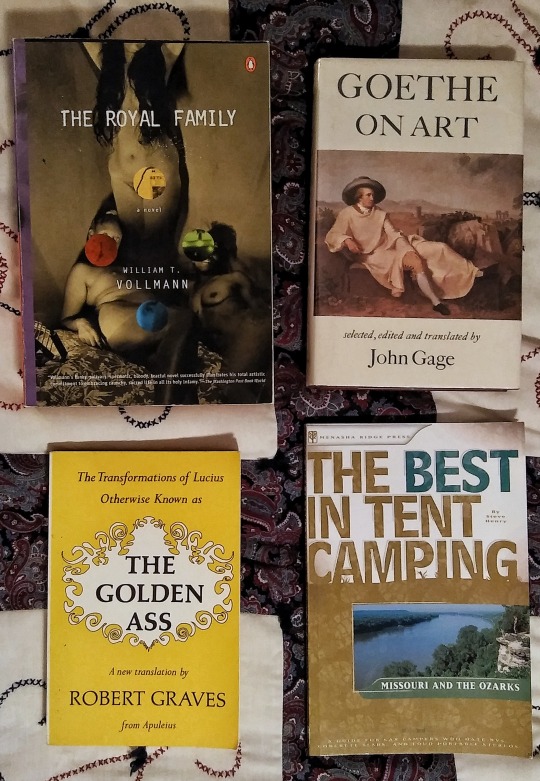
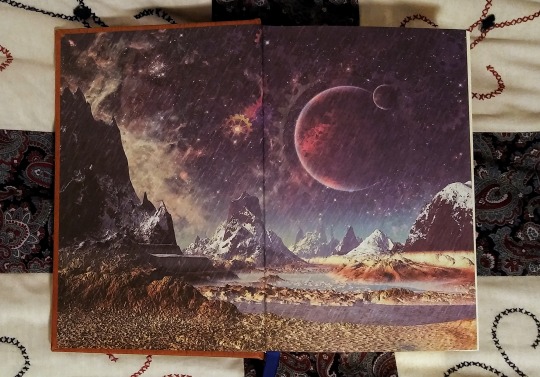
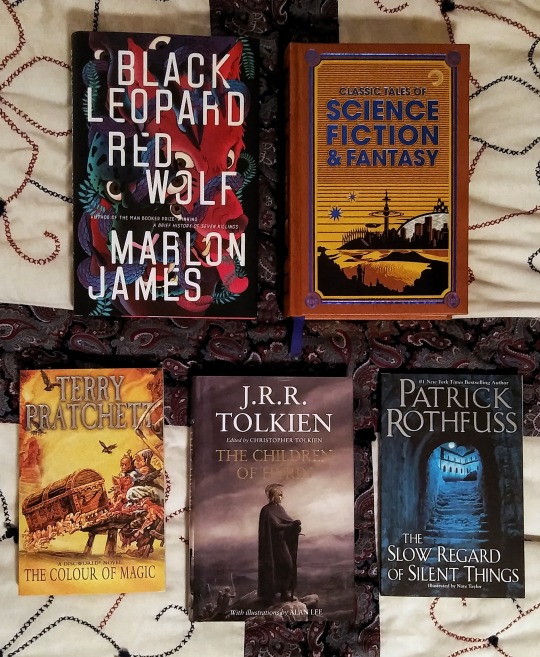
I'm woefully behind in posting new (to my library) books I've acquired, but here are a few from today. The Tolkien and James are both 1st ed. 1st printings, and the Rothfuss is a paperback 1st. The Terry Pratchett is the first book of his series that I've wanted to read for a long time, which I understand is both excellent and funny! I know I know--but I have and read a Lot of books in various genres and on diverse subjects. For instance, I finally finished Infinite Jest recently, and Loved it (and I believe I'm entitled to some sort of badge, or prize--according to several people I know, ha. It wasn't That thick, but it Was that funny and brilliant, plus you get to learn some new words)!
Anyway, the science fiction and fantasy collection is just a pretty, well-made book, with silk ribbon and gold embossing--plus who doesn't love decorative endpapers!? I include a shot of them too.
The others: A major artist on art is almost always a no-brainer, I liked that it was a Graves interpretation of the Golden Ass, I love nature and the outdoors and it's local, and then there's Vollman, haha. I don't know his work or much about him Yet, but after reading in a book on collectible books that he has some Really limited editions of well-made books (including one that comes with a ribbon made from the braided hair of prostitutes, which was an eye opener, lol) I read an article about him, and yeah, definitely interesting and pretty bizarre, so cool! The one I got here we had at work, and is a regular publishing of one of his books, so that I can check him out. The article about him, that I read in The New Republic spoke of his fascination with sex workers: "By his own account, Vollmann started hanging around sex workers as a way to get to know and better understand women. He first wrote about the subject in The Rainbow Stories, which is the kind of book Mark Twain might have written after smoking crank and hanging out with skinheads for six months." He's also adopted another persona as a woman, to further understand women, which his wife and daughter seem to roll with (along with all the other things he's done and written about, I guess they weren't That surprised). Another book of his called Butterfly Stories is described in the article this way "Butterfly Stories reads like Henry Miller de-romanticized and poxed with STDs, with the added looming specter of Cambodian genocide." So there's that, lol. Pretty crazy, original stuff, so cool. The article was called:
"You Are Now Entering the Demented Kingdom of William T. Vollmann," written by Tom Bissell, if interested.
~yb
#books#reading#collecting#imagination#knowledge#j.r.r. tolkien#patrick rothfuss#terry pratchett#marlon james#goethe#robert graves#science fiction#fantasy#art#outdoors#apuleius#william t. vollmann#personal library#bookstores#bargains#hpb
4 notes
·
View notes
Photo
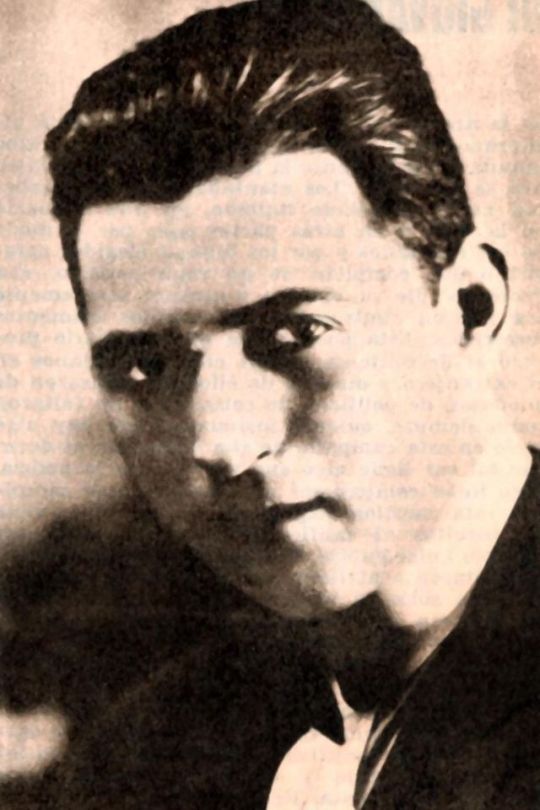
Grim History
Severino di Giovanni: Anarchist Bombs and Anti-fascism
The time period between World War I and World War II saw the rise of anarchism and fascism, two of the modern era’s most dangerous political movements. Italy was one of Europe’s hotbeds for radical extremism and as migrants went abroad in search of work and to escape poverty, they brought these ideologies with them. Argentina became one place where the two philosophies clashed with the anarchist Severino di Giovanni on the advanced guard, instigating the violence.
Born in Abruzzi to an impoverished family, Severino di Giovanni later claimed that the constant hunger pangs and fear of starvation would be the primary motivation for his interest in anarchist revolutionary politics. Anarchists of that time believed all people were naturally equal and blamed the mechanisms of government, economics, and private property for the social disequilibrium that resulted in some people having so much food they could never possibly ear it all while others were condemned to a life of scarcity, malnutrition, and the soul-destroying search for adequate means of survival. Therefore, a world without government would be a world of equality and peace. After growing up so poor, Giovanni emigrated to Buenos Aires, got involved in trade unionism, and embraced the convulsively liberating theory of anarchist violence.
Fascism was also on the rise in Argentina and many Italian fascists had also emigrated to that Latin American country. Upon his arrival, di Giovanni immediately began attending meetings with anarchist groups who planned to fight against the fascists who believed in enslaving the masses of industrial workers for their own capitalistic gain. In 1925, the fascists of Argentina held a public celebration in honor of the Italian king Victor Emmanuel III’s accession to the throne. Many prominent politicians and public figures from both Argentina and Italy were present along with a cadre of Black Shirt thugs, present to maintain order in the crowd. When the orchestra began playing the Italian national anthem, Severino di Giovanni and his companions began throwing anti-fascist leaflets in the air and shouting “Assassins! Thieves!” The Black Shirts beat them up and sent them on their way.
That same year, the trial of Sacco and Vanzetti took place in America. The two factory-working anarchists were accused of detonating a bomb that killed several people. The prosecution’s case rested on the fact that the two men had been caught with Italian language anarchist newspapers. The lawyer also argued that their Italian ancestry proved their guilt since, in the eyes of many Americans at that time when anti-immigration sentiment was at fever pitch, Italians were fundamentally incapable of civilized behavior. The judge was also well-known for having extreme anti-immigrant views. The defense claimed that the newspapers were planted by the police but the judge refused to allow that claim to be admitted as evidence and abruptly ended the trial. The jury found Sacco and Vanzetti guilty and sentenced them to death. A mistrial was declared but the judge refused to reopen the case, citing his dislike of Italian people as the cause. Eventually, Sacco and Vanzetti were executed. The case has since been seen as an example of American racism, xenophobia, and an unhealthy fear of immigrants. In the trade union and anarchist movement, it was seen as a rallying cry for revolution.
Severino di Giovanni had started his own newspaper called Culmine. It was a left wing political paper dedicated to labor issues; he quickly took up the cause of Sacco and Vanzetti and furiously published a storm of articles denouncing the injustice of the trial. Many of those articles made their way to newspapers in America. Di Giovanni was deeply impressed with the Galleanist idea of “propaganda of the deed”, a term signifying the use of public political actions to serve as an example for inspiring further political action. Severino di Giovanni had decided to take action.
The campaign started with a bombing of the U.S. embassy in Buenos Aires; the front of the building was demolished. The Argentinian police sought help from the fascists in the Italian embassy who captured di Giovanni, imprisoned him for five days, then released hum after torturing him the entire time. Di Giovanni and two of his friends then blew up a statue of George Washington and, later in the same day, set off a bomb at the office of the Ford Motor Company. The next day they blew up the house belonging to the Buenos Aires chief of police; he just barely escaped being killed because, without any knowledge of the impending attack, he had left his home and walked down the street to buy a pack of cigarettes. No doubt, ling cancer must have later accomplished the task that the bomb had failed to do.
Di Giovanni’s bombings continued into 1927 and 1928. The next targets were an American owned tobacco warehouse and branches of two American banks, Then di Giovanni and his two friends, the Scarfo brothers, killed a whole bunch of fascists when they bombed the Italian embassy; it was the deadliest terrorist attack in Argentinian history.
Severino di Giovanni’s propaganda of the deed turned out to have a polarizing effect. Some anarchists and unionists began accusing him of making their movements look reckless and evil. Others fell in love with his campaign of terror. Fighting broke out between the two sides until the publisher of an anarchist newspaper got assassinated. Some blamed di Giovanni for the murder but evidence seemed to point to other members of the anarchist community. Di Giovanni decided to end his bombings in order to make peace between the fighting workers.
In 1930, a military coup overthrew the government of Argentina. Severino di Giovanni married and settled down but eventually left his wife for a fifteen year old Italian immigrant named Fina, the sister of his two best friends, the Scarfo brothers. The couple went into hiding and di Giovanni found employment at a printing press. The police found out where he was working and raided the shop. The attempted arrest resulted in a gunfight; one officer died and the other got injured. Di Giovanni escaped. On a later date when di Giovanni was with Fina, the Scarfo brothers, and several other friends, the police again showed up and a firefight broke out. Di Giovanni was captured and Fina was arrested then set free because of her age.
Severino di Giovanni was executed by firing squad in 1931. He shouted “long live anarchy”, in Italian of course, before eight bullets pierced his body. His wife was shot a few hours later. The fascists eventually lost World War II. Both anarchism and fascism fizzled out and faded away as capitalism and communism took over. Those two sleeping dogs were not left to lie. Both anarchism and fascism began to re-emege as political ideologies starting in the 1960s. Without any chance of ever becoming a functioning political system, both still have an enormous potential to inspire destructive and murderous violence.
Vollman, William T., Rising Up and Rising Down: Some Thoughts on Violence, Freedom, and Urgent Means. Ecco, 2003.
https://grimhistory.blogspot.com/
6 notes
·
View notes
Photo

Pumpkin spice everything #whatthelibrarianwore #submission via @calledtostyle on Instagram “Self-deception is a pessimistic definition of optimism.” —William T. Vollman, Europe Central
#whatthelibrarianwore#long sweater#floppy hat#knee high boots#pumpkinspiceeverything#libraries#librarians#librarian#librarianship#librariansofig#librarian fashion#librarian outfit#librarian style#whatiworetoday#what i wore today#whatiwore#wiwt#ootdsubmit#ootdshare#ootd#ootdfashion#outfitinspo#outfitinspiration#book quotes#book#bookish#fallstyle#fall fashion
16 notes
·
View notes
Quote
The planet’s atmosphere will change but human nature won’t. Vollmann’s meager wish is for future readers to appreciate that they would have made the same mistakes we have. This might seem a humble ambition for a project of this scope, but only if you mistake Carbon Ideologies for a work of activism. Vollmann’s project is nothing so conventional. His “letter to the future” is a suicide note. He does not seek an intervention—only acceptance. If not forgiveness, then at least acceptance.
Nathaniel Rich at The Atlantic. The Most Honest Book About Climate Change Yet
William T. Vollmann’s latest opus is brilliant, but it offers no comfort to its readers.
No Immediate Danger: Volume One of Carbon Ideologies by William T. Vollman Viking
No Good Alternative: Volume Two of Carbon Ideologies by William T. Vollmann Viking
6 notes
·
View notes
Photo
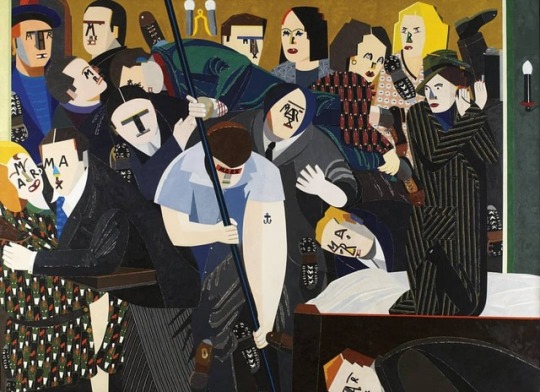
"De todas las multitudinarias arterias de San Francisco, la calle Geary es quizá la más importante de las ignoradas. Sí, las ignoradas, ¡menuda categoría! Detectives privados de oídos envidiosos, pederastas autocompasivos que desean "explicarse" a cada extraño de cada bar, prostitutas sin clientes, abogados que aún no han sido nombrados socios principales, y yo mismo, descrito en la introducción a la traducción japonesa de una de mis novelas como "un escritor menor" –ah, cómo pica–, y tú mismo, lector, cuyas cualidades son escasamente reconocidas en este mundo, y ya puestos todos los que seguimos con vida, pues hasta el momento hemos sido groseramente ignorados por la muerte; lo cual me recuerda a los muertos, pues éstos no sólo padecen nuestro olvido sino que además se ignoran entre sí…"⠀⠀ ⠀⠀ "Of all the crowded arteries of San Francisco, Geary Street is perhaps the most important of the ignored ones, yes, the ignored, small category! Private detectives with envious ears, self-pitying pedophiles who wish to" explain "themselves to every stranger in every bar , prostitutes without clients, lawyers who have not yet been named main partners, and myself, described in the introduction to the Japanese translation of one of my novels as "a minor writer" -ah, how it bites-, and yourself, reader whose qualities are scarcely recognized in this world, and already put all those who remain alive, because so far we have been grossly ignored by death, which reminds me of the dead, because they not only suffer our oblivion but also they ignore each other..."⠀⠀ ⠀⠀ William T. Vollman⠀⠀ La familia real / The Royal Family⠀ & Eduardo Arroyo (artist)⠀ ⠀ #art #portrait #portraitart #portraiture #portraitpainting #oilpaint #oilpainting #oiloncanvas #painting #contemporary #contemporaryart #contemporaryartist #contemporarypainting #newcontemporary #modernart #modernpainting #artgallery #contemporaryartgallery #visualart #visualartist #figurative #figurativeart #figurativepainting #artcollector #undergroundart #artgram #atdaily #instaart #marcopolorules #vagabondwho https://www.instagram.com/p/Bp1cFsVDcon/?utm_source=ig_tumblr_share&igshid=1uyu35bc82ebi
#art#portrait#portraitart#portraiture#portraitpainting#oilpaint#oilpainting#oiloncanvas#painting#contemporary#contemporaryart#contemporaryartist#contemporarypainting#newcontemporary#modernart#modernpainting#artgallery#contemporaryartgallery#visualart#visualartist#figurative#figurativeart#figurativepainting#artcollector#undergroundart#artgram#atdaily#instaart#marcopolorules#vagabondwho
1 note
·
View note
Text
I’m about 40 pages into The Rainbow Stories by William T Vollman (since I only read it at work and I started it on my last shift) and the writing style is amazing. My coworker handed it to me and said “You’d like this, it’s fucked up and it takes place in San Francisco”. So far it’s really interesting and the writing is amazing. It’s split into parts, each part is titled after a color and then each of those are divided into smaller vignettes, and they’re based on people and places Vollman knew/saw/interacted with in San Francisco. So far I’m only on the second one and it’s really interesting because the characters in this section of vignettes are all awful bigoted skinheads, and while Vollman writes them as human, well-rounded characters, his narration has this hilarious tinge of mockery and snarky judgement to it, like he’s writing these characters but he thinks they’re fucking idiots. It’s like Hubert Selby Jr but with a lot more authorial disagreement with the subject, where he writes the horrible things these characters say or do, but every few sentences a narration comes about where you can tell he doesn’t at all agree with what he’s writing. It’s interesting but also very cool to see quite vivid proof that you can write gross/evil/fucked up main characters or scenarios without necessarily agreeing with them (something I think a lot of people forget these days). But so far the characters are interesting and the writing is very cool.
#squash rambles#i love reading books that take place where i've lived#this is book number 14 or 17 depending on how you look at it
1 note
·
View note
Text
Are we completely fucked because of climate change?
In a review of William T. Vollman's Carbon Ideologies, a two-volume set of books that the review calls "the Infinite Jest of climate books", Wen Stephenson succinctly answers a question about our climate that is on many people's minds: Are we completely fucked because of climate change?
Yes, of course, we're fucked. (Though it's important to specify the "we" in this formulation, because the global poor, the disenfranchised, the young, and the yet-to-be-born are certifiably far more fucked than such affluent, white, middle-aged Americans as Vollmann and myself.) But here's the thing: with climate change as with so much else, all fuckedness is relative. Climate catastrophe is not a binary win or lose, solution or no-solution, fucked or not-fucked situation. Just how fucked we/they will be -- that is, what kind of civilization, or any sort of social justice, will be possible in the coming centuries or decades -- depends on many things, including all sorts of historic, built-in systemic injustices we know all too well, and any number of contingencies we can't foresee. But most of all it depends on what we do right now, in our lifetimes. And by that I mean: what we do politically, not only on climate but across the board, because large-scale political action -- the kind that moves whole countries and economies in ways commensurate with the scale and urgency of the situation -- has always been the only thing that matters here. (I really don't care about your personal carbon footprint. I mean, please do try to lower it, because that's a good thing to do, but fussing and guilt-tripping over one's individual contribution to climate change is neither an intellectually nor a morally serious response to a global systemic crisis. That this still needs to be said in 2018 is, to say the least, somewhat disappointing.)
I got this via Robinson Meyer, who calls it "as good an answer as I've seen".
16 notes
·
View notes
Link
0 notes
Link
Holy shit, what a cast. I just finished reading this, but now I guess I gotta listen to the audiobook too.
Nick Offerman as HANS VOLLMAN
David Sedaris as ROGER BEVINS III
Carrie Brownstein as ISABELLE PERKINS
George Saunders as THE REVEREND EVERLY THOMAS
Miranda July as MRS. ELIZABETH CRAWFORD
Lena Dunham as ELISE TRAYNOR
Ben Stiller as JACK MANDERS
Julianne Moore as JANE ELLIS
Susan Sarandon as MRS. ABIGAIL BLASS
Bradley Whitford as LT. CECIL STONE
Bill Hader as EDDIE BARON
Megan Mullally as BETSY BARON
Rainn Wilson as PERCIVAL “DASH” COLLIER
Jeff Tweedy as CAPTAIN WILLIAM PRINCE
Kat Dennings as MISS TAMARA DOOLITTLE
Jeffrey Tambor as PROFESSOR EDMUND BLOOMER
Mike O’Brien as LAWRENCE T. DECROIX
Keegan-Michael Key as ELSON FARWELL
Don Cheadle as THOMAS HAVENS
and
Patrick Wilson as STANLEY “PERFESSER” LIPPERT
with
Kirby Heyborne as WILLIE LINCOLN,
Mary Karr as MRS. ROSE MILLAND,
and Cassandra Campbell as Your Narrator
29 notes
·
View notes
Text
Books: Talking to William T. Vollman and more book news – Los Angeles Times
Los Angeles Times Books: Talking to William T. Vollman and more book newsLos Angeles Times1 book on our fiction bestseller list this week is "The Female Persuasion" by Meg Wolitzer, now in its fourth week on the list. "'The Female Persuasion' could be a traditional bildungsroman in which a character learns to balance cynicism with ... Leer más - Read more...
source https://www.self-helpbook.com/books-talking-to-william-t-vollman-and-more-book-news-los-angeles-times/
0 notes
Text
Lincoln in the Bardo: A Novel Stream Audio Book
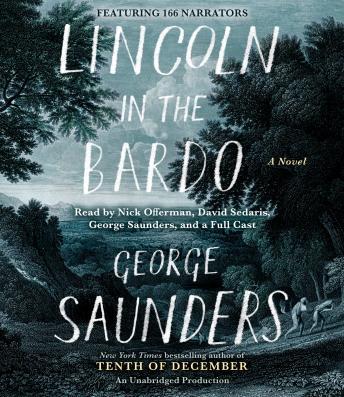
Get now >> Lincoln in the Bardo: A Novel Stream Audio Book
Lincoln in the Bardo: A Novel Stream Audio Book
The long-awaited first novel from the author of Tenth of December: a moving and original father-son story featuring none other than Abraham Lincoln, as well as an unforgettable cast of supporting characters, living and dead, historical and invented
February 1862. The Civil War is less than one year old. The fighting has begun in earnest, and the nation has begun to realize it is in for a long, bloody struggle. Meanwhile, President Lincoln’s beloved eleven-year-old son, Willie, lies upstairs in the White House, gravely ill. In a matter of days, despite predictions of a recovery, Willie dies and is laid to rest in a Georgetown cemetery. “My poor boy, he was too good for this earth,” the president says at the time. “God has called him home.” Newspapers report that a grief-stricken Lincoln returns, alone, to the crypt several times to hold his boy’s body.
From that seed of historical truth, George Saunders spins an unforgettable story of familial love and loss that breaks free of its realistic, historical framework into a supernatural realm both hilarious and terrifying. Willie Lincoln finds himself in a strange purgatory where ghosts mingle, gripe, commiserate, quarrel, and enact bizarre acts of penance. Within this transitional state—called, in the Tibetan tradition, the bardo—a monumental struggle erupts over young Willie’s soul.
Lincoln in the Bardo is an astonishing feat of imagination and a bold step forward from one of the most important and influential writers of his generation. Formally daring, generous in spirit, deeply concerned with matters of the heart, it is a testament to fiction’s ability to speak honestly and powerfully to the things that really matter to us. Saunders has invented a thrilling new form that deploys a kaleidoscopic, theatrical panorama of voices to ask a timeless, profound question: How do we live and love when we know that everything we love must end?
The 166-person full cast features award-winning actors and musicians, as well as a number of Saunders’ family, friends, and members of his publishing team, including, in order of their appearance:
Nick Offerman as HANS VOLLMAN
David Sedaris as ROGER BEVINS III
Carrie Brownstein as ISABELLE PERKINS
George Saunders as THE REVEREND EVERLY THOMAS
Miranda July as MRS. ELIZABETH CRAWFORD
Lena Dunham as ELISE TRAYNOR
Ben Stiller as JACK MANDERS
Julianne Moore as JANE ELLIS
Susan Sarandon as MRS. ABIGAIL BLASS
Bradley Whitford as LT. CECIL STONE
Bill Hader as EDDIE BARON
Megan Mullally as BETSY BARON
Rainn Wilson as PERCIVAL “DASH” COLLIER
Jeff Tweedy as CAPTAIN WILLIAM PRINCE
Kat Dennings as MISS TAMARA DOOLITTLE
Jeffrey Tambor as PROFESSOR EDMUND BLOOMER
Mike O’Brien as LAWRENCE T. DECROIX
Keegan-Michael Key as ELSON FARWELL
Don Cheadle as THOMAS HAVENS
and
Patrick Wilson as STANLEY “PERFESSER” LIPPERT
with
Kirby Heyborne as WILLIE LINCOLN,
Mary Karr as MRS. ROSE MILLAND,
and Cassandra Campbell as Your Narrator
Praise for the audiobook
“Lincoln in the Bardo" sets a new standard for cast recordings in its structure, in its performances, and in its boldness. Now, let's see who answers the challenge.” – Chicago Tribune
“Like the novel, the audiobook breaks new ground in what can be accomplished through a story. It helps that there’s not a single bad note in the cast of a whopping 166 people. It’s also the rare phenomenon of an audiobook being a completely different experience compared to the novel. Even if you’ve read the novel, the audiobook is worth a listen (and vice versa). The whole project pushes the narrative form forward.” – A.V. Club
“The result is an auditory experience unlike any other, where the awareness of individual voices disappears while the carefully calibrated soundscape summons a metaphysical masterpiece. This is a tour de force of audiobook production, and a dazzling realization of Saunders’ unique authorial structure.”—Booklist
“The finished audiobook’s tapestry of voices perfectly mirrors the novel.”—Entertainment Weekly
Praise for George Saunders
“No one writes more powerfully than George Saunders about the lost, the unlucky, the disenfranchised.”—Michiko Kakutani, The New York Times
“Saunders makes you feel as though you are reading fiction for the first time.”—Khaled Hosseini
“Few people cut as hard or deep as Saunders does.”—Junot Díaz
“George Saunders is a complete original. There is no one better, no one more essential to our national sense of self and sanity.”—Dave Eggers
“Not since Twain has America produced a satirist this funny.”—Zadie Smith
“There is no one like him. He is an original—but everyone knows that.”—Lorrie Moore
“George Saunders makes the all-but-impossible look effortless. We’re lucky to have him.”—Jonathan Franzen
“An astoundingly tuned voice—graceful, dark, authentic, and funny—telling just the kinds of stories we need to get us through these times.”—Thomas Pynchon
Lincoln in the Bardo: A Novel Stream Audio Book
0 notes